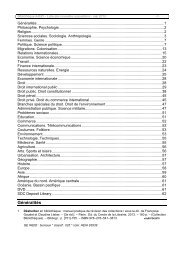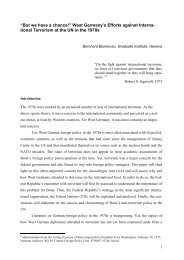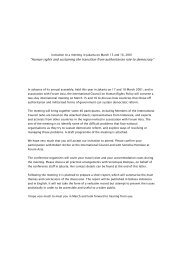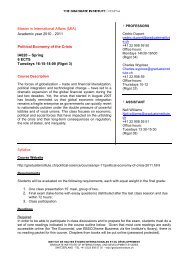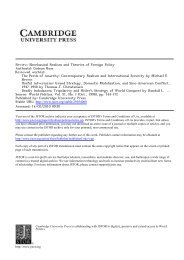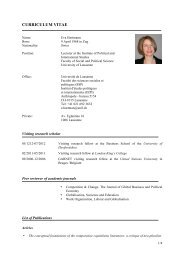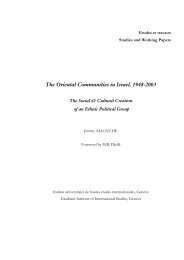Extending International Criminal Law beyond the Individual to ...
Extending International Criminal Law beyond the Individual to ...
Extending International Criminal Law beyond the Individual to ...
Create successful ePaper yourself
Turn your PDF publications into a flip-book with our unique Google optimized e-Paper software.
<strong>Extending</strong> <strong>International</strong> <strong>Criminal</strong> <strong>Law</strong> 901<br />
have been held judicially accountable for violations of international law, albeit<br />
usually through national jurisdictions. Before we turn <strong>to</strong> <strong>the</strong>se developments,<br />
we should, however, briefly canvass some of <strong>the</strong> doctrinal ideas that continue<br />
<strong>to</strong> influence our thinking.<br />
2. The Subject of Subjects and <strong>the</strong> Question of<br />
<strong>International</strong> Legal Personality 6<br />
James Brierly, in his quest <strong>to</strong> reduce <strong>the</strong> focus on <strong>the</strong> state and emphasize <strong>the</strong><br />
rights and obligations of individuals that make up <strong>the</strong> state, attacked <strong>the</strong> doctrine<br />
which sought <strong>to</strong> exclude o<strong>the</strong>r ac<strong>to</strong>rs from subjectivity, and he played<br />
with <strong>the</strong> concept of personality:<br />
Even <strong>the</strong> state, great and powerful institution as it is, can never express more than a part of<br />
our personalities, only that part which finds expression in <strong>the</strong> purpose or purposes for<br />
which <strong>the</strong> state exists; and however important <strong>the</strong>se purposes may be, however true it<br />
may be that <strong>the</strong>y are in a sense <strong>the</strong> prerequisite condition of o<strong>the</strong>r human activities in a<br />
society, <strong>the</strong>y never embrace <strong>the</strong> whole of our lives. 7<br />
Brierly asks us <strong>to</strong> suspend our belief in <strong>the</strong> sanctity of subjectivity and sharpen<br />
our senses.<br />
If, <strong>the</strong>refore, we approach <strong>the</strong> question of <strong>the</strong> subjects of international law with a true<br />
perception of what <strong>the</strong> personality of states entails, it becomes difficult <strong>to</strong> believe that<br />
<strong>the</strong>re can be anything sacrosanct about a practice which treats states as <strong>the</strong> subjects of<br />
<strong>the</strong> international community. It is not a principle, but essentially a rule of expediency, and<br />
mainly a rule of procedure. 8,9<br />
Brierly foresaw o<strong>the</strong>r entities becoming subjects of international law, just as<br />
‘<strong>the</strong> law of any state has for its subjects both individuals and institutions’, 10 and<br />
his depiction of <strong>the</strong> assumption that states are <strong>the</strong> exclusive subjects of international<br />
law as a ‘rule of procedure’ is particularly helpful in our context.<br />
<strong>International</strong> criminal law operates before multiple tribunals with different<br />
jurisdictions and rules. Although all <strong>the</strong> international tribunals established so<br />
6 The following sections draw on my book Human Rights Obligations of Non-State Ac<strong>to</strong>rs (Oxford:<br />
Oxford University Press, 2006).<br />
7 J.L. Brierly,‘The Basis of Obligation in <strong>International</strong> <strong>Law</strong>’ in H. Lauterpacht and C.H.M.Waldock<br />
(eds), The Basis of Obligation in <strong>International</strong> <strong>Law</strong> and O<strong>the</strong>r Papers by <strong>the</strong> Late James Leslie Brierly<br />
(Oxford: Clarendon Press, 1958), 1^67, at 51; English version of a course originally delivered at<br />
<strong>the</strong> Hague Academy of <strong>International</strong> <strong>Law</strong> in 1928 ‘Le Fondement du caracte' re obliga<strong>to</strong>ire du<br />
droit international’, 23 Recueil des Cours (1928), iii.<br />
8 Sovereignty, Seisen, And <strong>the</strong> League’, 7 Fischer Williams, ‘Sovereignty, Seisen, And <strong>the</strong> League’,<br />
BritishYear Book of <strong>International</strong> <strong>Law</strong> (1926), 23 (footnote in <strong>the</strong> original).<br />
9 Brierly, supra note 7, at 51. Cited in part and discussed by J.E. Nijman, The Concept of<br />
<strong>International</strong> Legal Personality: An Inquiry In<strong>to</strong> <strong>the</strong> His<strong>to</strong>ry and Theory of <strong>International</strong> <strong>Law</strong> (The<br />
Hague: T.M.C. Asser Press, 2004), 146.<br />
10 Brierly, supra note 7, at 52.



![Download [pdf] - The Graduate Institute, Geneva](https://img.yumpu.com/23370020/1/190x248/download-pdf-the-graduate-institute-geneva.jpg?quality=85)
